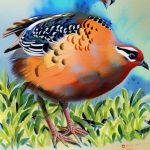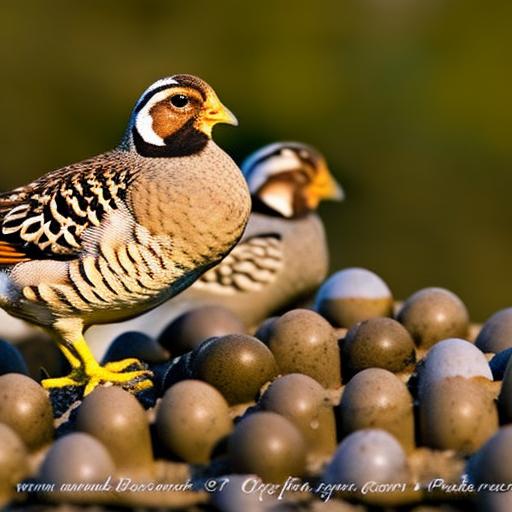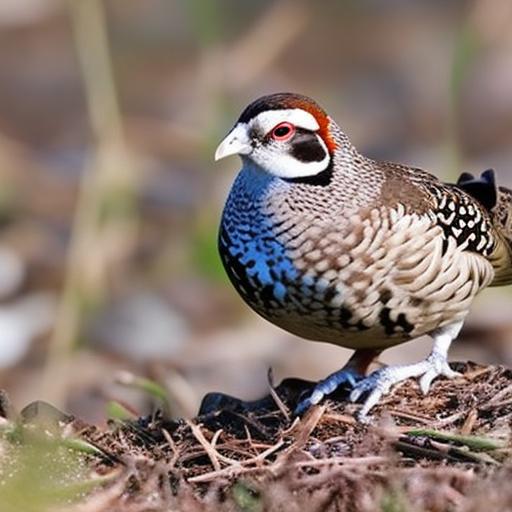Quail breeding farming is a lucrative and rewarding venture for individuals interested in poultry farming. Quails are small, ground-dwelling birds that are known for their delicious and nutritious meat and eggs. They are also relatively easy to care for and require minimal space, making them an ideal choice for small-scale farmers and backyard breeders. Quail breeding farming can be a profitable business, as there is a high demand for quail meat and eggs in the market due to their health benefits and unique taste. Additionally, quails have a high reproductive rate, which means that they can produce a large number of eggs and offspring in a short period of time. This makes quail breeding farming a sustainable and profitable business opportunity for individuals looking to enter the poultry industry.
Quail breeding farming can be done on a small scale, making it accessible to individuals with limited space and resources. Quails are known for their ability to thrive in small enclosures, making them an ideal choice for urban farmers and individuals with limited land. Additionally, quails are low-maintenance birds that require minimal care and attention, making them an ideal choice for individuals with busy schedules. With the right knowledge and resources, quail breeding farming can be a profitable and sustainable business venture for individuals looking to enter the poultry industry.
Table of Contents
- 1 Selecting the Right Quail Breeds for Breeding
- 2 Setting Up the Quail Breeding Environment
- 3 Breeding and Incubating Quail Eggs
- 4 Caring for Quail Chicks and Adults
- 5 Managing Health and Nutrition of Quail
- 6 Marketing and Selling Quail and Quail Products
- 7 FAQs
- 7.1 What is a quail breeding farm?
- 7.2 What are the benefits of a quail breeding farm?
- 7.3 What do quail breeding farms require to operate?
- 7.4 What are the common challenges of running a quail breeding farm?
- 7.5 What are some common breeds of quail raised on breeding farms?
- 7.6 Are there any regulations or guidelines for operating a quail breeding farm?
Key Takeaways
- Quail breeding farming is a profitable venture that requires proper knowledge and planning.
- Selecting the right quail breeds for breeding is crucial for successful and efficient production.
- Setting up the quail breeding environment involves creating a suitable space for breeding and egg incubation.
- Breeding and incubating quail eggs require careful monitoring of temperature and humidity levels.
- Caring for quail chicks and adults involves providing proper nutrition, housing, and protection from predators.
Selecting the Right Quail Breeds for Breeding
When it comes to quail breeding farming, selecting the right quail breeds is crucial for the success of your venture. There are several different quail breeds to choose from, each with its own unique characteristics and traits. Some popular quail breeds for breeding include the Coturnix quail, Bobwhite quail, and California quail. When selecting quail breeds for breeding, it is important to consider factors such as egg production, meat quality, and adaptability to the local climate. The Coturnix quail, for example, is known for its high egg production and fast growth rate, making it an ideal choice for individuals looking to focus on egg and meat production. On the other hand, the Bobwhite quail is known for its delicious meat and adaptability to different climates, making it a popular choice for backyard breeders.
It is important to research and understand the specific characteristics and requirements of each quail breed before making a decision. Consider factors such as space availability, climate, and market demand when selecting quail breeds for breeding. Additionally, it is important to source your quail breeds from reputable breeders to ensure the health and quality of your breeding stock. By selecting the right quail breeds for breeding, you can set yourself up for success in the quail breeding farming industry.
Setting Up the Quail Breeding Environment
Setting up the right environment for quail breeding is essential for the health and productivity of your birds. Quails require a clean, safe, and comfortable environment to thrive and reproduce. When setting up the quail breeding environment, it is important to consider factors such as housing, nesting areas, feeding and watering systems, and ventilation. Quails are social birds that thrive in groups, so it is important to provide adequate space for your birds to move around and interact with each other. Additionally, providing nesting areas with suitable bedding materials is essential for encouraging egg laying and reproduction.
The housing for quails should be secure and predator-proof to ensure the safety of your birds. It is important to provide adequate ventilation in the quail housing to prevent respiratory issues and maintain air quality. Feeding and watering systems should be easily accessible to the birds and kept clean to prevent contamination and disease. By setting up the right environment for quail breeding, you can create a comfortable and productive space for your birds to thrive and reproduce.
Breeding and Incubating Quail Eggs
Breeding and incubating quail eggs is a crucial aspect of quail breeding farming. Quails are prolific layers, with some breeds laying up to 300 eggs per year. To successfully breed quails, it is important to provide the right conditions for egg laying and incubation. Quails reach sexual maturity at around 6-8 weeks of age, at which point they will start laying eggs. It is important to provide nesting areas with suitable bedding materials to encourage egg laying and reproduction. Collecting eggs regularly is essential to prevent them from being damaged or eaten by the birds.
Incubating quail eggs is a delicate process that requires careful monitoring of temperature and humidity levels. Quail eggs typically take around 17-18 days to hatch, with some variation depending on the specific breed. It is important to invest in a reliable incubator and follow the recommended guidelines for temperature and humidity levels during the incubation period. Turning the eggs regularly is also important to ensure proper development of the embryos. By carefully breeding and incubating quail eggs, you can ensure a steady supply of chicks for your quail breeding farming venture.
Caring for Quail Chicks and Adults
Caring for quail chicks and adults is essential for their health and productivity. Quail chicks require special care and attention during their first few weeks of life to ensure proper growth and development. Providing a warm and draft-free brooding area is essential for keeping the chicks comfortable and healthy. It is important to provide suitable bedding materials, such as pine shavings or straw, to keep the brooding area clean and dry. Additionally, providing access to clean water and high-quality chick starter feed is essential for meeting the nutritional needs of the chicks.
As quail chicks grow into adults, it is important to provide them with a suitable housing environment that meets their social and reproductive needs. Providing adequate space, nesting areas, feeding and watering systems, and ventilation is essential for ensuring the health and productivity of adult quails. Regularly cleaning the housing area and providing access to fresh water and high-quality feed is essential for maintaining the health of adult quails. By providing proper care and attention to both quail chicks and adults, you can ensure the success of your quail breeding farming venture.
Managing Health and Nutrition of Quail

Managing the health and nutrition of quails is essential for their overall well-being and productivity. Quails require a balanced diet that meets their nutritional needs at each stage of their life cycle. Providing access to high-quality feed that is specifically formulated for quails is essential for meeting their nutritional requirements. Additionally, providing access to clean water at all times is essential for maintaining the health of your birds.
Regularly monitoring the health of your quails is important for identifying any potential issues early on. Common health issues in quails include respiratory infections, parasites, and nutritional deficiencies. It is important to work with a veterinarian who has experience with poultry to develop a health management plan for your quails. Additionally, practicing good biosecurity measures, such as quarantining new birds and regularly cleaning and disinfecting the housing area, is essential for preventing the spread of diseases.
Marketing and Selling Quail and Quail Products
Marketing and selling quail meat and eggs can be done through various channels, including direct sales to consumers, local markets, restaurants, and specialty food stores. Developing a marketing strategy that highlights the unique taste and health benefits of quail products can help attract customers. Consider offering value-added products such as marinated quail meat or pickled quail eggs to appeal to a wider audience.
Building relationships with local chefs and restaurants can also help create a steady market for your quail products. Consider offering samples or hosting cooking demonstrations to showcase the versatility of quail meat in different cuisines. Additionally, consider participating in local food festivals or farmers’ markets to increase visibility and attract new customers.
In conclusion, quail breeding farming is a rewarding venture that offers numerous opportunities for individuals interested in poultry farming. By selecting the right quail breeds, setting up the appropriate breeding environment, carefully breeding and incubating quail eggs, providing proper care for quail chicks and adults, managing their health and nutrition, as well as developing effective marketing strategies, individuals can build a successful quail breeding farming business that meets market demand while providing nutritious products to consumers. With careful planning and dedication, individuals can establish themselves in the poultry industry through quail breeding farming.
If you’re considering starting a quail breeding farm, you’ll want to ensure that you provide the best nutrition for your quails. Understanding what vegetables do quails eat is essential for their health and productivity. Poultry Wizard has a helpful article on this topic, which provides valuable insights into the dietary needs of quails. You can learn more about it here.
FAQs
What is a quail breeding farm?
A quail breeding farm is a facility where quails are raised and bred for their eggs, meat, or for sale as pets. These farms can range in size from small backyard operations to large commercial enterprises.
What are the benefits of a quail breeding farm?
Quail breeding farms provide a sustainable source of quail eggs and meat, which are high in protein and low in fat. They also contribute to the conservation of quail species and provide economic opportunities for farmers.
What do quail breeding farms require to operate?
Quail breeding farms require suitable housing, feeding, and watering systems for the quails. They also need to adhere to regulations regarding animal welfare, biosecurity, and food safety.
What are the common challenges of running a quail breeding farm?
Common challenges of running a quail breeding farm include disease management, predator control, and market fluctuations. Additionally, maintaining optimal environmental conditions for the quails can be a challenge.
What are some common breeds of quail raised on breeding farms?
Common breeds of quail raised on breeding farms include Coturnix quail, Bobwhite quail, and California quail. Each breed has its own unique characteristics and suitability for different purposes.
Are there any regulations or guidelines for operating a quail breeding farm?
Regulations and guidelines for operating a quail breeding farm vary by location, but typically include requirements for animal welfare, biosecurity, and food safety. It is important for quail breeders to familiarize themselves with local laws and regulations.
Meet Walter, the feathered-friend fanatic of Florida! Nestled in the sunshine state, Walter struts through life with his feathered companions, clucking his way to happiness. With a coop that’s fancier than a five-star hotel, he’s the Don Juan of the chicken world. When he’s not teaching his hens to do the cha-cha, you’ll find him in a heated debate with his prized rooster, Sir Clucks-a-Lot. Walter’s poultry passion is no yolk; he’s the sunny-side-up guy you never knew you needed in your flock of friends!







